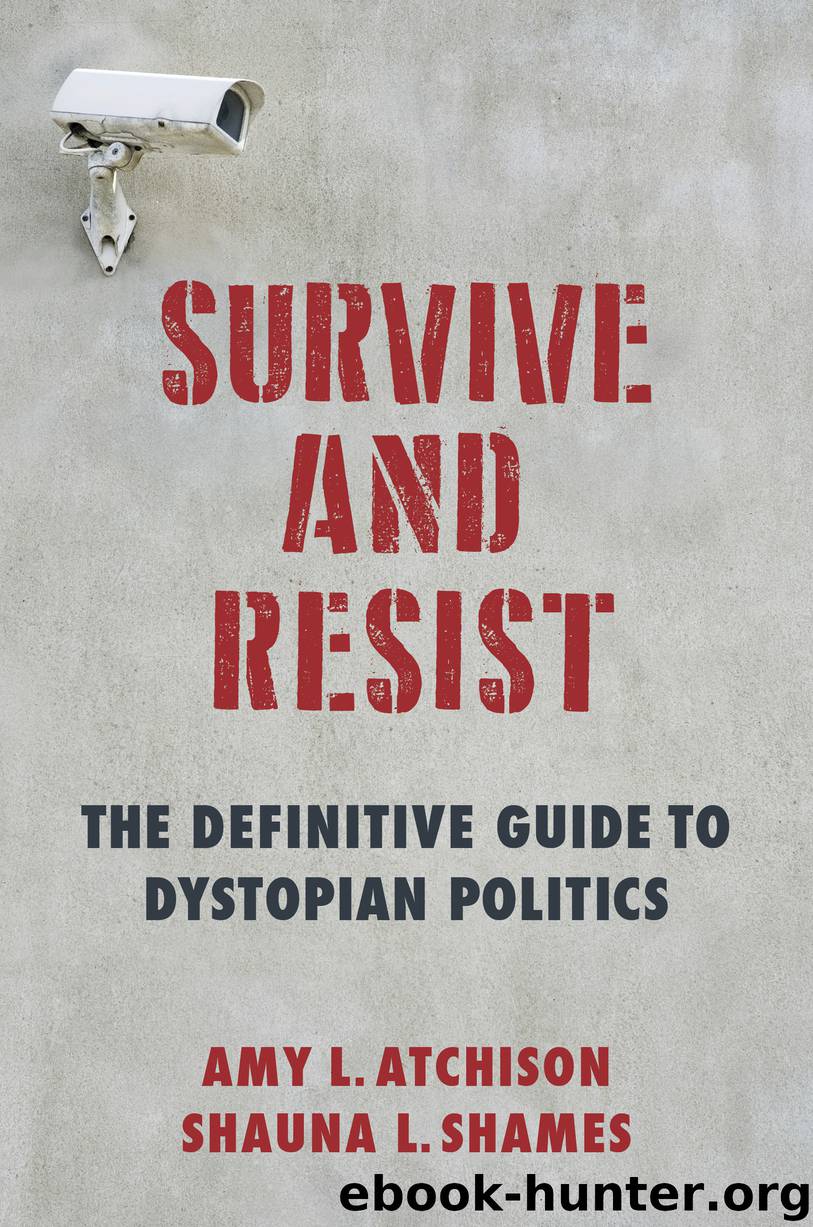Survive and Resist by Shauna L. Shames

Author:Shauna L. Shames
Language: eng
Format: epub
Publisher: Columbia University Press
An individual mosquito is fairly easy to slap away, but have you ever been surrounded by a cloud of the suckers? You can’t slap away all of them. A collective nonviolent resistance movement works the same way. A good resistance movement will provide cover for its individual actors, who would be immediate targets if working alone.
Dystopian fiction offers us some instructive examples of failed rebellions, and often the problem is that no one joins in. Take the failed “soma uprising” in Huxley’s Brave New World. In this world, humans are conditioned from birth to be happy and unthinking drones, medicated by the government with soma. John, raised in a different culture, finds the constant drugging disquieting. His ill-fated protest involves commandeering a drug dispensary and throwing all the soma out the window; this does not sit well with the addicted masses or their corporate overlords. Instead of joining him, the Deltas try to tear him limb from limb. Poor John failed to understand the need for collective action and badly misjudged the situation. As long as the Deltas remained deeply addicted to the government-provided drug, they would not join the rebellion.
The problem for John, and for most nascent movements, is that collective action is (to put it mildly) often a miserable exercise in frustration. Writing in 1965, Mancur Olson delved more deeply into the challenges of collective action. Just because people have interests in common, Olson pointed out, does not mean they will organize together to achieve them.1 Instead, individuals always have an incentive to free ride on the work of others; why join a movement when you could sit back, watch other people work hard, and then enjoy the same benefits? Free riders are just along for the ride; they get to the same destination, but without contributing gas money or sharing the driving.
Free riding is the biggest problem that any collective action faces, and free riders are the big reason you hate group projects. First, the bigger the group gets, the more likely someone is to stop contributing to the group’s goal (someone else will pick up the slack, right?). Second, if there’s already a collective action taking place, then the work is getting done, so if you’re risk averse/work averse, why join? Essentially, you have a group of people working toward a common goal and another group who want to see that goal attained but who aren’t willing to join the action to make it happen. That second group is the free riders—they benefit from other people’s participation in the collective action.
Download
This site does not store any files on its server. We only index and link to content provided by other sites. Please contact the content providers to delete copyright contents if any and email us, we'll remove relevant links or contents immediately.
| Anarchism | Communism & Socialism |
| Conservatism & Liberalism | Democracy |
| Fascism | Libertarianism |
| Nationalism | Radicalism |
| Utopian |
The Secret History by Donna Tartt(16621)
The Social Justice Warrior Handbook by Lisa De Pasquale(11489)
Thirteen Reasons Why by Jay Asher(7788)
This Is How You Lose Her by Junot Diaz(5769)
Weapons of Math Destruction by Cathy O'Neil(5036)
Zero to One by Peter Thiel(4824)
The Myth of the Strong Leader by Archie Brown(4789)
Promise Me, Dad by Joe Biden(4447)
Beartown by Fredrik Backman(4415)
Stone's Rules by Roger Stone(4415)
How Democracies Die by Steven Levitsky & Daniel Ziblatt(4398)
The Fire Next Time by James Baldwin(4342)
100 Deadly Skills by Clint Emerson(4076)
A Higher Loyalty: Truth, Lies, and Leadership by James Comey(4032)
Rise and Kill First by Ronen Bergman(4012)
The David Icke Guide to the Global Conspiracy (and how to end it) by David Icke(3881)
The Farm by Tom Rob Smith(3872)
Secrecy World by Jake Bernstein(3782)
The Doomsday Machine by Daniel Ellsberg(3730)
